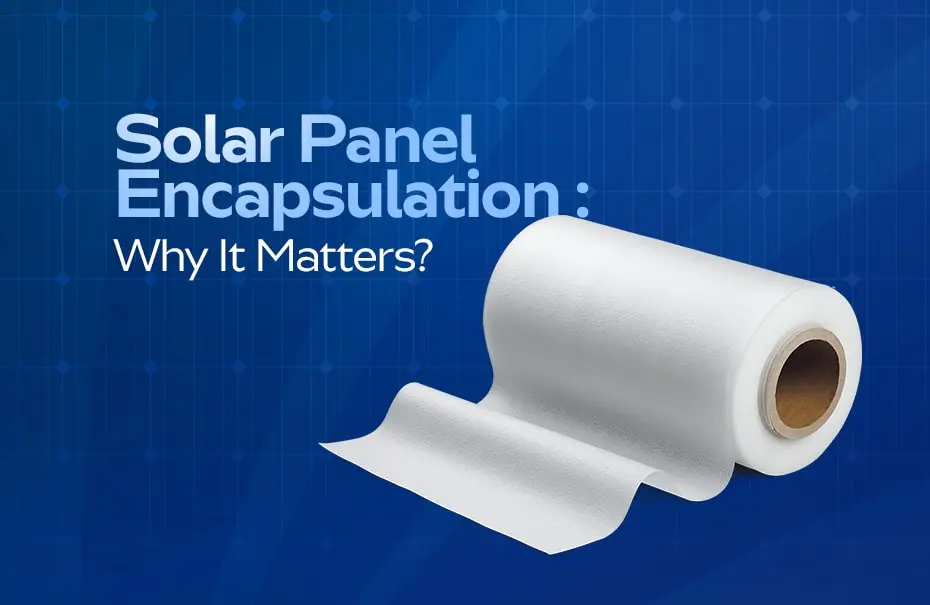Importance and Main Features of Solar Encapsulant in Solar Panel (EVA Sheet in Solar Panel)

Solar panel encapsulation refers to the process of sealing photovoltaic (PV) cells and other components with polymeric materials to ensure the longevity and durability of the solar panel. Encapsulation is critical for the operational stability of PV cells. Solar encapsulant diminishes the effects of weather-related factors (such as moisture, UV radiation, oxidation, and extreme temperature) and augments solar cells’ resistance to external forces. The encapsulation layer safeguards the solar cell and guarantees its reliability and effectiveness.
This article dwells on the benefits of solar panel encapsulation, its key consideration, and why it matters for solar panel modules.
Role of Encapsulants in Solar Panels
Encapsulating solar panels refers to the method of securing solar cells with a safeguarding layer of encapsulant material. This encapsulation substance shields the solar cells from moisture, dirt, and various pollutants that may lead to damage to solar cells. The procedure includes laminating the solar cells’ top and bottom surfaces with a thin layer of polymer, such as ethylene-vinyl acetate (EVA), Polyolefin (POE) or other appropriate materials, such as PVB, ionomer, or silicone.
While the most popular encapsulant is EVA, Solar panel experts may suggest various other materials based on examination of the solar panel established site and its prevailing environmental conditions.
Main Features to Look in Solar Encapsulant
Encapsulant materials should be affordable and suitable for residential and industrial use. They must withstand environmental stressors and maintain long-term stability, ideally for over two decades. The essential criterion for each encapsulation element is its ability to safeguard solar cells from external deterioration factors.
The encapsulation material must encompass a range of characteristics as detailed below:
Superior Mechanical Strength
Superior tensile strength and peel bond of encapsulants with either glass of backplanes ensure that various layers of the solar panel are securely held together and well bonded. This prevents delamination and eliminates moisture ingress or air from penetrating the panel.
Exceptionally high optical transmittance
The encapsulation material should allow maximum sunlight penetration into the solar cells by minimizing reflection and refraction. Encapsulation materials designed with optimized optical properties can reduce CTM losses and keep solar cell efficiencies intact.
Electrical insulation
Electrical insulation properties protect solar cells and other electrical components from damage caused by electrical faults or lightning strikes and prevent short circuits.
Mechanical Support and Reinforcement
Mechanical support and properties such as high strength and flexibility ensure the solar panel can withstand the mechanical stresses and strains that it may be subjected to during its lifetime. This competency is essential for solar panels’ durability and lifespan.
UV resistance
The encapsulation material should be resistant to UV radiation, which can cause degradation of the material due to prolonged exposure to sunlight. UV-resistant encapsulation materials withstand exposure to sunlight for many years without deteriorating.
Effective heat conduction
Encapsulation material’s thermal properties helps to dissipate the heat generated by the solar cells and prevent the cells from overheating.
Ability to withstand thermal fluctuations
Changes in temperature amidst operation and extreme fluctuations in environmental conditions can cause an adverse impact on solar panels’ efficiency. Encapsulation materials do not have thermal fluctuations.
Resistance to Oxidation
Corrosion can degrade the solar cells and damage the panel. The encapsulation material should be resistant to the natural oxidation process.
Pro Tips Before Purchasing Encapsulant for Your Solar Business
- Carefully inspect the quality of encapsulant material before the purchase
- Verify the company’s certification and ensure that the encapsulant materials adhere to industry standards and regulatory guidelines.
- Choose manufacturers that follow best practices and adhere to current IEC standards
Importance of Solar Panel Encapsulation
Now that we have learned about the features of solar encapsulant, let us discover importance of EVA in solar panel:
Maintains optical and electrical transmissivity by excluding moisture
Moisture and dust deposited on solar cells will hamper the sunlight from reaching the cells and also hinder electric transmission. Encapsulation negates this by providing a protective cover against moisture and dust.
Maintain the structural integrity of the solar panel
Encapsulation also helps to prevent the deformation of solar panels and maintain their integrity by protecting fragile solar cells from damage and degradation over time.
Maintains the performance of solar panels
Proper encapsulation is crucial to the performance and lifespan of the solar panel, as it protects the delicate solar cells and electrical components and helps in keeping the performance intact.
Other Benefits of Encapsulants in Solar Panels
- Low repair costs due to increased stability and strength of the solar panel
- Longer lifespan for solar panels
- Allows solar panel implementation in harsh climates by protecting the panel components from environmental stressors
- Increased savings on electricity output by improving the performance
Conclusion
Solar cells are vulnerable to adverse factors such as the oxidation process, mechanical stress, UV radiation, fluctuations in temperature, internal heating due to overload, and many other hazards. As a result, appropriate encapsulation is required to shield solar cells and keep their energy output stable.
Vishakha Renewables is a leading provider of solar encapsulation services, and our encapsulants feature No PID, exceptional solar transmission, excellent adhesion with Glass and Backsheets, superior dielectric properties, water/vapor resistance, high tensile strength, and quicker lamination. We provide a complete range of solar panel solutions, From choosing the right encapsulant for your cells to lamination suggestions.
For more details on solar encapsulants and expert advice, feel free to contact us.
